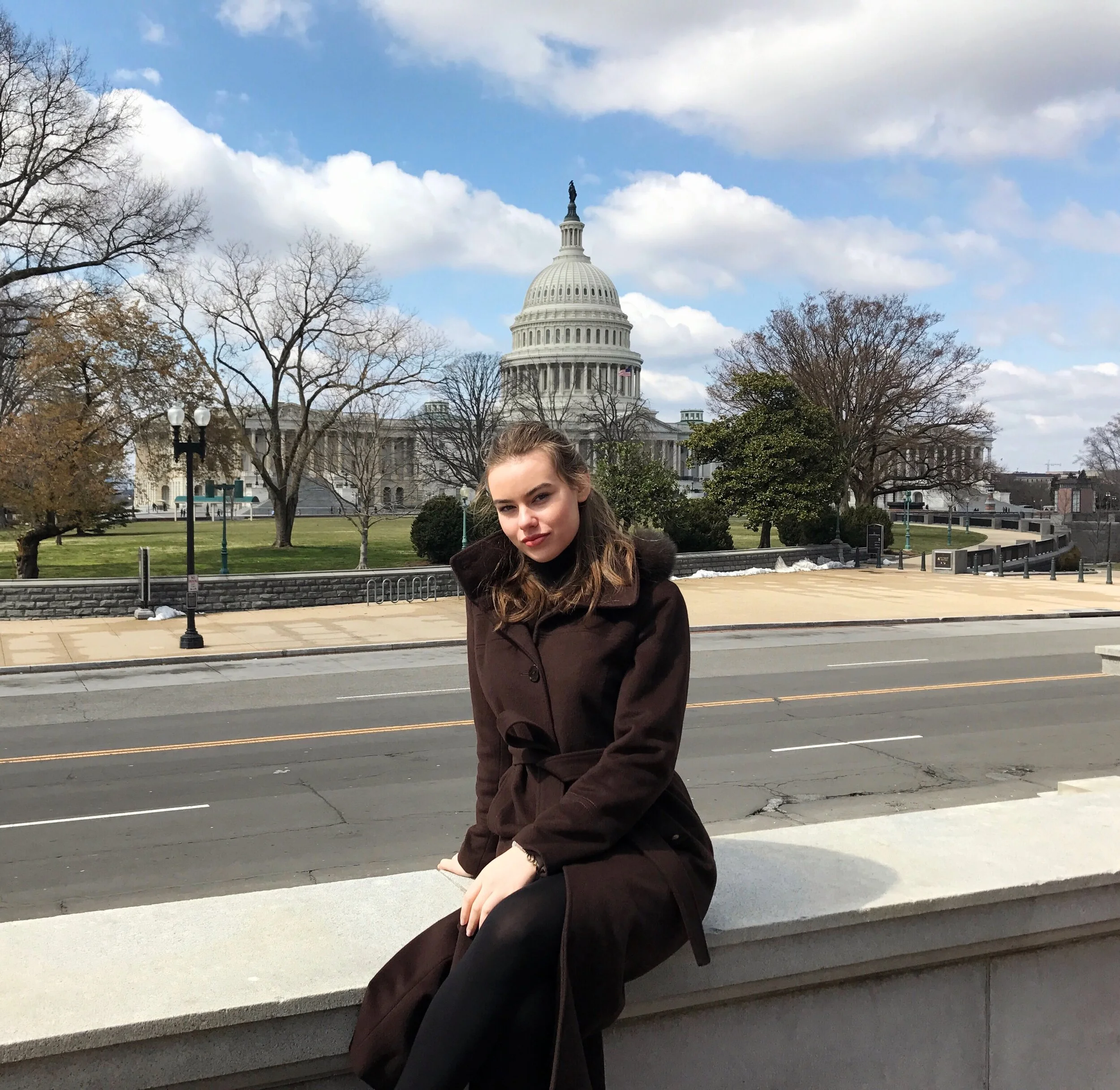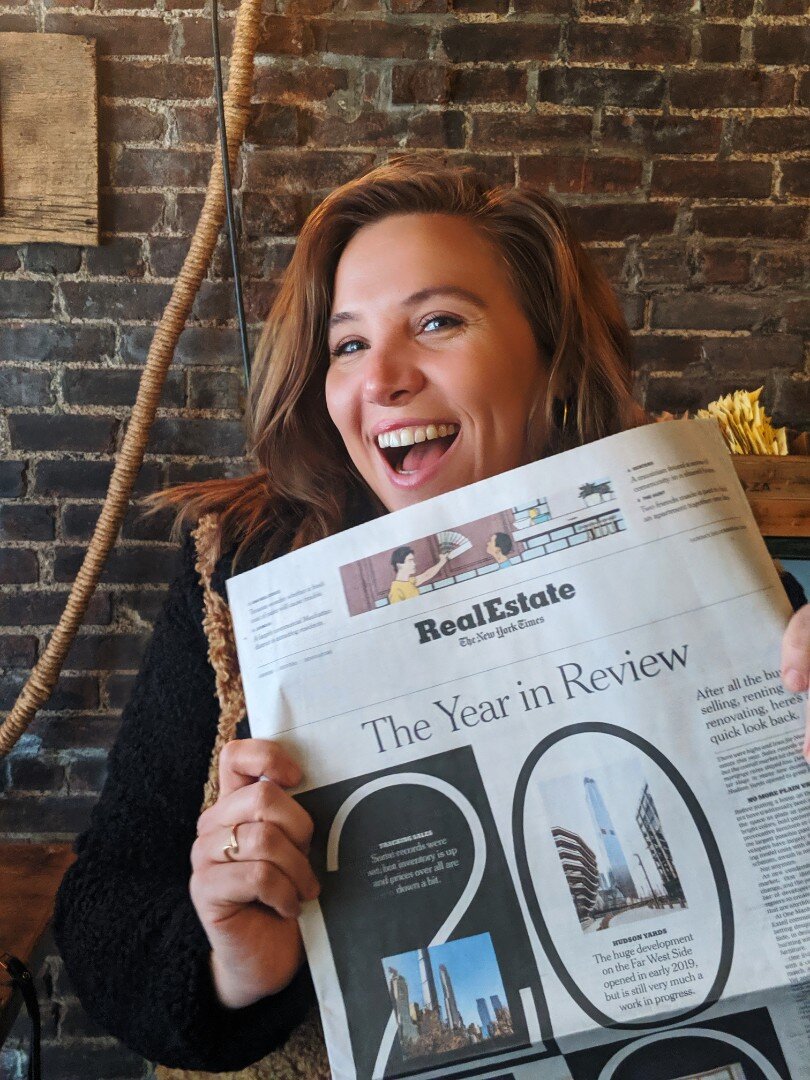Anastassia Gliadkovskaya came to The King’s College in New York City as a 17-year-old from California with a background in performance classical piano and a burgeoning career in fashion modeling. Very quickly at King’s, she started gravitating to journalism classes, reporting for The Empire State Tribune and pursuing training and internships from The Daily Dot in New York to EuroNews in France to the European Journalism Institute in Prague. She worked for Prof. Paul Glader and Dr. David Tubbs as a faculty assistant. Her tireless work ethic led her to Columbia University’s Graduate School of Journalism, where she studied investigative reporting, and now is continuing her reporting career. She took a pause from reporting to answer questions from Prof. Glader.
Q: Tell us about your current role at Forbes magazine and what you are doing there?
A: I’m a reporting intern on the wealth team at Forbes, covering billionaires. My primary role is to help put together the World’s Billionaires issue, which comes out this spring. I help value the net worth of the billionaires on our list (possibly close to 2,700 this year!), and I also write about billionaires who are doing something unique or interesting.
Q: You put the time in with internships during your time at King’s. Tell us about that process and how internships helped you develop as a journalist. And how did the MPJI team help facilitate some of those internships?
A: Getting newsroom experience early is fundamental to getting ahead in the industry. Every employer looks for three things — newsroom experience, clips and the ability to find unique stories. Without the foundational internships in undergrad, I would be having a much more difficult time landing prestigious positions. Internships varied, but they ultimately all taught me to always think quickly and commit myself fully to what I was doing, even if I was afraid or uncertain. I’m lucky MPJI strongly encouraged me to apply for every right opportunity that presented itself. I was able to figure out what I like and don’t like early on, and what my strengths and weaknesses are.
Q: After college at King’s, you applied to the Columbia University Graduate School of Journalism, were you were accepted and completed a Master’s in journalism. Prof. Lisi and I were glad to see that as we are fellow Columbia alums. Tell us about some of the key skills and knowledge you gained at Columbia.
A: Some of the most memorable teachings to me have got to be ethics and information warfare reporting. My ethics class challenged me to consider scenarios both hypothetical and real that called for difficult decisions. Would I publish if I got my information this way? Would I approach a source, given x circumstance? Would I have done what that reporter did? In class we debated, considered and justified. We heard every argument for and against. Not every student had the same answer — and that was the point. We had to dig deep into ourselves to understand where we each wanted to draw lines, morally. It was a critical class for establishing my own standards and defining what kind of reporter I want to be. Information warfare reporting was a class I chose to take, but strongly believe every student should be required to. In it, we learned about the dynamics of platforms and ads, how to investigate them and the dangers of amplification. In a time when we are all vulnerable to bad actors and disinformation online, it is more important than ever to study the ecosystems in which they thrive and the myriad ways they find to take advantage.
Q: You studied at the Stabile center at Columbia, which focuses on investigative reporting. What are some key software, apps, skillsets you think are really helpful to young journalist today especially if they want to do investigative reporting?
A: In terms of investigative reporting, the first outlet and resource that comes to mind is Bellingcat. I see it as the holy grail of modern investigative and digital forensics reporting. In addition to incredible longform reporting, like this, Bellingcat offers everything from guides to case studies to newsletters to webinars. Bellingcat reporters rely on OSINT — open source intelligence — to conduct their investigations. What that means is they don’t just rely on people as sources, but also on publicly available data. On that note, I highly recommend Craig Silverman’s Verification Handbook, which you can find for free online. It’s as close to a comprehensive course on information warfare reporting as you can get. In general, knowing how to work with complex datasets is critical to investigative reporting. Taking a course on advanced Excel at Columbia propelled my work to another level — I strongly suggest taking a course on at least Excel, but also on R or SQL if you want to really get into data reporting. I am attending the NICAR conference this year, led by IRE, which is quite affordable since it’s online this year — keep an eye on this annual conference! IRE’s annual conference is great, too, but less focused on the data reporting aspect. IRE membership is a huge plus to have, and IRE also features fantastic resources on its website. Also, sign up for LinkedIn Premium — journalists qualify for a free version. It is my favorite hack for finding and connecting with sources.
Q: You graduated last May (2020) right? Into a tough Coronavirus-affected market. What has been your strategy to keep reporting and moving forward in your career?
A: I graduated last May, online. Columbia’s career fair got short-squeezed because of the pandemic, and it was clear that the job market would not be forgiving in 2020. But thanks to how much reporting I got to do at Columbia and King's, I felt comfortable freelancing if I had to. I was lucky to land a reporting fellowship during the summer through a program Columbia sponsored last-minute for graduates, but after that ended in August I freelanced for the rest of the year. The key to keep moving forward is to not think of reporting as the only thing that will strengthen your skills and qualifications. Reporters have tons of assets — copy editing, fact-checking, content writing, researching, filing records requests. There’s a job market out there for all of those, and we can definitely work those gigs to pay the bills if needed. So many reporters in the field have a side gig — and it typically pays much more than reporting does! I think one of the biggest misconceptions I overcame after graduating was that if I wasn’t reporting, I was failing. That’s just not the case. And as a freelancer, I had time to pursue longer investigations that I really cared about. My biggest advice would be to take every opportunity that presents itself and put yourself out there. Join Study Hall — an incredible network of freelancers that offers everything from a Slack chat to pitch guides to a database of editors’ emails. Be active on Twitter and network. Help promote other reporters’ work. DM editors with your questions and pitches. These things have not only kept me preoccupied during this turbulent time but also have helped me progress.
Q: Was there a pivotal moment for you when you realized you were all in on journalism as a calling or career?
A: My sophomore year, several King’s students including myself had taken a trip with you, Paul, to Washington, D.C., for a journalism conference. There, we got to hear Edward Snowden speak via video call. It was a once in a lifetime experience. I’ll never forget the things he said, how he encouraged us in our fight for the truth and for exposing corruption. I felt so alive and invigorated, I knew this was what I am meant to be doing.
Q: What would you tell high school or college students who want to be journalists regarding the importance of studying in NYC?
A: I realize it’s a privilege to study and live in New York City, and that not everyone can do so. But for me, it was the reason I got into this business, so I owe a lot to the city. Here, you're surrounded by the biggest and most important hallmarks in the world. I remember waiting in line in the dark, waking hours of a chilly fall morning to attend Good Morning America in Times Square. I remember touring the New York Stock Exchange, the Museum of American Finance, The Wall Street Journal, ProPublica, Vice. Few things can inspire a budding reporter like getting to walk inside some of the most exciting halls of our time. And learning to report in a place like NYC will make you a more dogged and patient reporter. You’ll be running around the city figuring out the subway system, hauling equipment and trying to convince strangers to talk to you, and that’s just your typical Monday morning. But that’s what will make you better as a person and more competitive as a reporter. You’ll prove yourself, and you will be rewarded; having lived here for several years, I have established many connections that I trust will go a long way to support my career. If you can be anywhere, this is the place.
Q: What else would you like to tell friends of MPJI and future students at our various programs?
A: Reach out to other reporters and editors. Ask questions. Apply again for jobs when you get turned down. Always be thinking about ways to tell unique stories and always propose new ideas! Figure out what you like and hone that niche. If your mother tells you she loves you, check it out!
Q: How did your time at TKC help you find your path in journalism?
A: I am so grateful that I ended up at a small school like TKC and that it had such a thriving journalism program. I realize that had I gone to a giant undergrad school, I would have been paid much less attention to by professors and mentors. It would have also been more difficult to get involved on campus, and there would have been more bureaucracy to push through to implement change or to experiment with, say, the campus paper’s content. Naturally, with such a small set of students, TKC is able to closely monitor and mold its students’ progress, when it wants to. I think the journalism program is a brilliant example of that. I never felt forgotten or unimportant thanks to the individualized mentoring and encouragement I received from professors and older students alike. Both the big things, like internship recommendations, and the seemingly smaller things, like resume workshops, were of key importance. You can’t succeed in the industry if you aren’t prepared, and you can’t succeed in college if you don’t have guidance. My consistent excitement about reporting and confidence in my own abilities was nurtured because of both.
MPJI is based at The King’s College in New York City. MPJI provides education, training and professional development projects for journalists at the high school, undergraduate and professional levels. It is named after the late John McCandlish Phillips, a legendary reporter at The New York Times.
Follow us on Twitter, Instagram, and Facebook @JMPjournalism and LinkedIn at McCandlish Phillips Journalism Institute.










